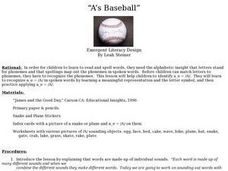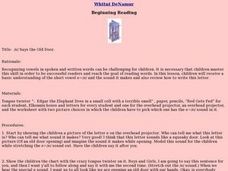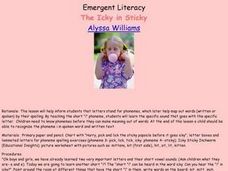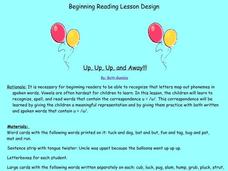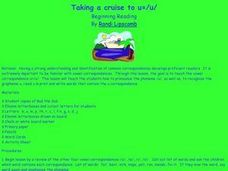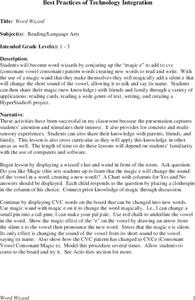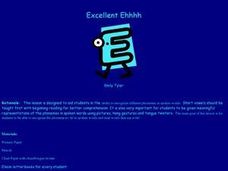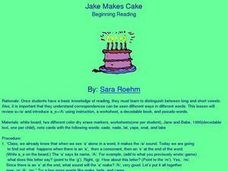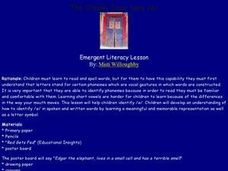Curated OER
Language Arts: Becoming Fluent Readers
First graders develop letter-sound correspondence skills by segmenting words according to their phonemes. Using letter tiles and letter boxes, they spell words called by the teacher. After reading several books with the teacher, 1st...
Curated OER
When is Ed Fed?
Students recognize the short vowel "E" in written and spoken language. Through listening and writing activities, they discriminate the short vowel /e/ from other vowel sounds. Students associate the phoneme with its letter representation...
Curated OER
Icky Sticky Tin Man
Students recognize the short vowel i in written and spoken language. Through listening and matching activities, they discriminate the vowel sound /i/ from other phonemes. Students associate the phoneme with its letter representation and...
Curated OER
A's Baseball
First graders distinguish between short vowel a and long vowel a. They are introduced to the vowel-consonant-e pattern that changes short vowel sounds into long vowel sounds. They practice reading words with the vowel-consonant-e pattern.
Curated OER
The Old Door
Young scholars recognize the short vowel e in written and spoken language. Through listening and matching activities, they discriminate the vowel sound /e/ from other phonemes. Students identify the phoneme and letter in words and a...
Curated OER
Uh, Bugs
Students recognize the short vowel u in written and spoken language. Through listening activities, they discriminate the vowel sound /u/ from other phonemes. Students associate the phoneme with its letter representation and identify the...
Curated OER
Icky, Icky, Sticky!
Students recognize the short vowel I in written and spoken language. Through matching activities, they discriminate the short vowel /i/ from other vowel sounds. Students associate the phoneme with its letter representation and identify...
Curated OER
The Icky in Sticky
Students study the /i/ sound by listening to it in words and a tongue twister which they later recite. Next, they practice writing the letter and making word using letterboxes. They listen to 'Icky Sticky Inchworm' while placing their...
Curated OER
Up, Up and Away
Students recognize the short vowel u in written and spoken language. Through matching and listening activities, they discriminate the vowel sound /u/ from other phonemes. Students identify the phoneme and letter in words and pictures.
Curated OER
It's Icky Sticky
Young scholars recognize the short vowel a in written and spoken language. Through matching and listening activities, they discriminate the vowel sound /a/ from other phonemes. Students identify the phoneme and letter in pseudo words...
Curated OER
E-E-E-E-Extra E-E-E-E-Effort
Students listen to a tongue twister emphasizing the short e sound. They practice writing the letter e and attaching different words with that sound to it. They listen to a book about a dog that enhances the letter e. They write a...
Curated OER
Iiicky, Stiicky, I
First graders recognize the short vowel i in written and spoken language. Through listening and matching activities, they discriminate the vowel sound /i/ from other phonemes. Students identify the phoneme and letter in psuedo words they...
Curated OER
Abigail Ant
Pupils recognize the short vowel a in written and spoken language. Through matching and listening activities, they discriminate the vowel sound /a/ from other phonemes. Students identify the phoneme and letter in words and pictures.
Curated OER
Home Spelling Practice: Long I, Long O
In this spelling instructional activity, learners learn to spell a list of 20 words. All contain the sound of long O or long I. Students write each word one time on the lines.
Curated OER
Elmer the Elephant
First graders recognize the short vowel E in written and spoken language. Through matching activities, they discriminate the short vowel /e/ from other phonemes. Students associate the phoneme with its letter representation and spell...
Curated OER
Taking a Cruise To U=/u/
Students complete a variety of activities related to the short /u/ sound. As a class they recite a tongue twister, then spell different words containing the short /u/ using letter manipulatives. Students then read the book "Bud the...
Curated OER
Reintroduce an Irregular Word
Students explore language arts by participating in a pronunciation activity. In this irregular word lesson, students must identify irregular words used in class and pronounce them when their teacher refers to one in class. Students...
Curated OER
Word Wizard
Students make magic wands to become word wizards who add the magic "e" to word with cvc patterns. They make reading cards, and a multimedia presentation show the use of the word patterns.
Curated OER
Excellent Ehhhh
Students make the different e sounds and practice a chant about the e sounds. They use a letterbox to write different words utilizing the e sounds. They listen to a story about a dog named Red that emphasizes the e sound. They write a...
Curated OER
Jake Makes Cake
Students distinguish between short vowel a and long vowel a. They are introduced to the vowel-consonant-e pattern that changes short vowel sounds into long vowel sounds. They practice changing words to long vowel sounds by adding an...
Curated OER
The Creaky Door says /e/
Students explore the short /e/ sound, and identify the short /e/ in writing. Students read fun sentences from the board which emphasize the short /e/. They stretch out the /e/ sound every time they come to it while reading. They then...
Curated OER
Spelling-Long E Words
In this spelling worksheet, students copy a set of 6 long e spelling words. Parents are given suggestions to help students study and learn the words.
Curated OER
Eek, It's a Spider
Students recognize the short vowel e in written and spoken language. Through listening and matching activities, they discriminate the vowel sound /e/ from other phonemes. Students identify the phoneme and letter in words while reading a...
Curated OER
What's Behind the Creaky Door?
First graders are introduced to the concept that letters stand for the mouth moves that we make when sounds are made. They practice making the /e/ sound and compare it to the sound a creaky door makes and then try saying the tongue...





